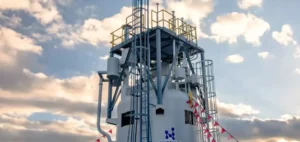Czech state-owned energy company CEZ recently announced plans to launch three SMRs by 2040. The first SMR is expected to be launched in Temelin around 2032, while the other two will be built in the second half of the 2030s. Ladislav Kriz, spokesman for the CEZ, confirmed this information in a statement to AFP.
Construction of PRMs
The first SMR will be built in Temelin, near one of the two nuclear power plants controlled by CEZ, which covers about one third of the total Czech electricity production. The next two SMRs will be built at the group’s coal-fired power plants, with the aim of switching from fossil fuels to decarbonized technologies. CEZ is also considering other locations for additional SMRs, including near its other nuclear plant in Dukovany and other coal-fired plants.
The benefits of MRP
According to Tomas Pleskac, a member of the CEZ board of directors, “SMRs are not intended to replace large nuclear units, they complement the Czech energy mix as a practical substitute for coal-fired power plants and large CO2-emitting heating plants.” SMRs are considered a practical and affordable alternative to more powerful conventional reactors. RMS systems and components can be factory assembled and transported in complete units to their installation location, making them relatively simple to build.
A new large nuclear reactor planned
In addition to SMRs, CEZ also plans to launch a new large nuclear reactor at Dukovany by 2036. Late last year, the group received offers from Westinghouse, EDF and KHNP for the project.
MRPs in the European energy context
SMRs are being considered by several European countries, as they can be a practical solution to complement the energy mix while reducing CO2 emissions. Global energy prices have also skyrocketed due to Russia’s reduced energy exports in response to sanctions imposed on it following the invasion of Ukraine.
The launch of SMRs by CEZ represents an important step in the development of nuclear energy in the Czech Republic. SMRs are seen as a practical and affordable alternative to more powerful conventional reactors, and can help the country transition from fossil fuels to decarbonized technologies.






















